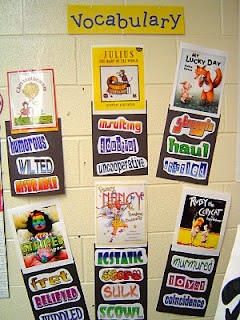It's a pretty simple concept: if a student doesn't understand a large amount of the words that he/she is reading in a given book, then the student will have trouble understanding the book as a whole. Therefore, a student with a vivid, strong vocabulary will have a greater success in reading. So how do we create "vivid, vital, and valuable vocabularies"?
There are many teachers (in the past and present) who believe that strengthening vocabulary comes from looking up the definition to a set of "weekly vocab words". I can remember doing this very often throughout my elementary and middle school years. I was recently surprised to see that there are still teachers who assign this on a weekly basis. A couple of weeks ago, I was a tutoring a student and she pulled out a list of vocabulary words that she had to define. Although this can help students learn the meanings and define words, this activity does not really lead a student to better reading comprehension.

There are many ways that teachers can improve the vocabularies of students and, in turn, strengthen their reading comprehension. Some examples of this are the following: (Chapter 6 of Classrooms that Work)
-play show in tell with objects that students might not be familiar with or know the names of, in addition demonstrate the use of new vocabulary in the way that you describe these objects (get objects from both home and school)
-use classroom experiences/stories to develop a greater vocabulary by using descriptions that students may have not heard before
-use technology and media to introduce new objects and concepts that students may not be familiar with and experience in everyday life
-play charades with new vocabulary words
-teacher read-alouds with introduction of three, new vocab words in a story; After learning the new vocabulary words, display a picture of the book and the vocab words that go along with that particular story. An example from Pinterest is to the left.
In addition, the article, "The Vocabulary-Rich Classroom: Modeling Sophisticated Word Use to Promote Word Consciousness and Vocabulary Growth" by Holly Lane and Stephanie Allen, explains the way that a teacher vastly improved her five-year-old students' vocabulary simply through the daily classroom and routines of the students. In the beginning of the year, Ms. Barker used simple terms to describe the classroom jobs for the students and the students used basic vocabulary when executing their classroom jobs, but as the year went on the teacher began using more challenging and descriptive vocabulary--and so did the students.
What do you believe is the best way to improve a student's vocabulary?

I believe a student's vocabulary can be strengthened through repeated exposure of words. I mentioned in another comment that my teachers would present the terms, then never revisit them after the test. I think in order for students to actually utilize new vocabulary terms in their everyday language, they must be exposed to them over and over and over.
ReplyDeleteVocabulary is best learned interactively! An excitable teacher who puts vocab in ALL activities motivates students to be on the lookout for new vocabulary.
ReplyDelete